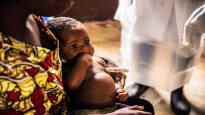The high-level pandemic exercise simulated the spread of a laboratory-modified monkey pox virus. The imaginary time of the exercise coincides with the spread of monkey pox in the real world.
24.5. 09:16 • Updated May 24. 11:32
Experts implicitly warned in the spring of 2021 that the monkey pox virus could cause a dangerous pandemic.
The possibility of the disease spreading emerged in the scenario of a global pandemic preparedness exercise.
The seed of truth was in the simulation, as the monkeypox virus began to spread now in May in areas where the disease is not usually present.
According to the World Health Organization (WHO), as of May 21, monkeypox infections have been confirmed in less than 100 countries in Europe, North America and Australia.
Monkey pox is caused by a smallpox related virus. Symptoms include blistering. The disease is transmitted from animal to human and usually occurs in Africa.
The aim is to improve preparedness against biological threats
The Nuclear Threat Initiative (NTI) and the Munich Security Conference, which aims to reduce the threat to biological and nuclear weapons, organized a pandemic exercise in March 2021 in which, in an imaginary scenario, an unusual monkey pox virus begins to spread around the world from an imaginary Brinian state.
The purpose of the exercise was to find ways to improve the world’s preparedness against biological threats. NTI published an exercise on their report (switch to another service) in November 2021.
The exercise was attended by 19 high-ranking leaders and experts from different continents. They work in healthcare, the biotechnology industry, charity and international security.
Participants included the Bill and Melinda Gates Foundation, the pharmaceutical company Johnson & Johnson, the U.S. National Security Council, the United Nations, and the World Health Organization.
The simulation revealed shortcomings at different levels
Participants drew four key conclusions.
According to them, the world’s ability to detect and assess communicable diseases and to warn of the threat of a pandemic posed by them is deficient. The international community needs a more effective and transparent alert system that can provide rapid information on pandemic risks.
There are also shortcomings in national preparedness for the spread of communicable diseases. Better national contingency plans are needed to respond to new pandemics.
According to the participants, the supervision of biological research is inadequate.
Viruses are intentionally modified in laboratories. Researchers aim to gain a better understanding of pandemics. Modifying viruses develops vaccines and treatments for diseases.
On the other hand, through such research, viruses can be made more contagious and dangerous, making them suitable as biological weapons.
According to experts involved in the pandemic exercise, the international system for managing various virus tests does not meet today’s security requirements and is not sufficiently prepared for future challenges.
In the context of the corona pandemic, the Wuhan Institute of Virology has been suspected of dangerously modifying bat coronaviruses. According to laboratory leakage theory, such a modified virus would have escaped and caused a corona pandemic.
The world needs a new health warning system
NTI writes in its report that global capabilities for biosafety and pandemic preparedness need to be strengthened. In this way, the world would be better able to prevent and respond to new biological threats in the future.
A progressive and transparent international health warning system should be set up under the auspices of the World Health Organization.
National governments should adopt a proactive approach to responding to a pandemic, rather than simply responding to an increasing number of illnesses and deaths. Governments should develop contingency plans that define “triggers” for the various actions to be taken.
In addition, a global health security fund should be set up to improve the capacity of different countries to respond to pandemics.
You can discuss the topic on May 25th. until 11 p.m.
